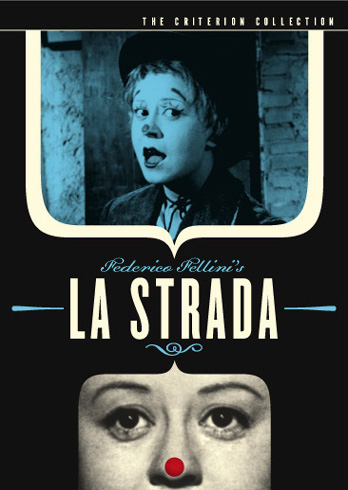|
Reviews of Recent Independent, Foreign, & Documentary Films in Theaters and DVD/Home Video
LA STRADA
DVD Features: Video Introduction by Martin Scorsese. Commentary by Peter Bondanella, author of
The Cinema of Federico Fellini. Documentary Federico Fellini's Autobiography.
Optional English-dubbed Soundtrack. Essay by Film Scholar Peter Matthews. English Subtitles. Trailer.
At the heart of Federico Felliniís 1954 film is a saucer-eyed clown of a woman named
Gelsomina, bought with a few coins into the service of Zampanò, a brutish strongman with a
heart as hard as his muscular exterior. Together, they perform their traveling circus act on the
road of life, passing through weddings, carnivals, and religious processions. La Stradaís
narrative structure is more episodic than linear Ė much like different circus acts within a show Ė
but it is in the subtleties of these seemingly arbitrary incidents that we become enamored with the
childlike Gelsomina. As soon as Zampanò places a bowler hat on her head and she responds with
a playful dance, her natural flair for comedy becomes apparent. Atypical amongst Felliniís later
surrealist films, La Strada owes much of its timeless appeal to Giulietta Masina, Felliniís
wife, brilliant in an often mute performance. The beautifully executed score by Nino Rota is
captivating, managing to blend a somber ballad with circus whimsy, and the repetition of
Gelsominaís leitmotif takes on powerful meaning as the film builds to an emotional crescendo.
The black-and-white photography looks stunning on Criterionís digitally restored transfer,
showcasing the bleak existence of these traveling vagabonds.
DVD Extras: Martin Scorseseís brief explication of La Strada is inappropriately
titled an introduction, as it should not be seen before a first viewing. It is worth watching after
the film to discover Felliniís influence on Scorseseís own work; for example, Zampanò as the
inspiration for Raging Bullís Jake La Motta. The audio commentary is provided by film
scholar Peter Bondanella, author of The Cinema of Federico Fellini, whose expertise in
Italian neorealism and the particulars of Felliniís work make his commentary a worthy
complement to the film, but could be dry for those without at least a working knowledge of
Italian film history. The documentary, Federico Felliniís Autobiography, originally aired
on Italian television in 2000, is essential viewing for Fellini fans, as it features candid interviews
with the director over a number of years. Though hardly revealing in its celebratory approach to
the legendary director, it nonetheless contains important historical source material and footage of
Felliniís cinematic career. Kim Reyes
|
